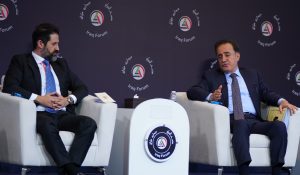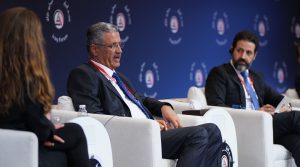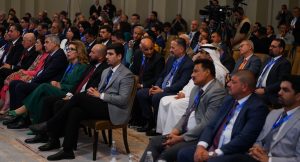- Hayan Abdulghani Al-Sawad, Deputy Prime Minister and Minister of Oil
- Qubad Talabani, Deputy Prime Minister of Kurdistan Region of Iraq
- Adil Karim, Deputy Minister of Electricity
- Abdulla Al-Qadi, Crescent Petroleum, UAE
- Lizzie Porter, Journalist, Iraq Oil Report (Moderator)
As one the world’s top oil producers, Iraq has the world’s fifth largest proven petroleum reserves, but only a fraction of these are in development. Iraq’s energy sector is heavily dependent upon oil, with revenues from crude oil exports accounting for over two-thirds of the country’s GDP, and the country’s significant gas reserves and other renewable energy sources underutilised. The necessary infrastructure for the latter energy sources is lacking, and that for the oil industry requires modernisation.
There are opportunities for international partners and investors to take advantage of this need, but the onus is on the Iraqi policy makers to attract and facilitate such investment. To date, Iraq does not have a hydrocarbon law, as mandated by the Constitution, creating issues between central and peripheral governments. This panel took place over a month since exports from the Kurdistan Region of Iraq were halted by Turkey on March 25 as a result of the arbitration ruling by the International Chamber of Commerce, with Reuters estimating that the Kurdistan Regional Government (KRG) has lost over $850 million in revenue over the following month. In the session, government ministers and experts critically appraised the energy sector and discussed how it might be made fit for the future, particularly as the country faces the task of moving away from environmentally destructive practices.
The Deputy Prime Minister and Minister of Oil, Hayan Abdulghani Al-Sawad, addressed the issue of the pipeline blockage and emphasised that “the reason they are not still online is because of the arbitration ruling….. We have negotiations with colleagues from the Turkish government [which] are ongoing,” he said, acknowledging the impact from the recent earthquake. “We received news from the Turkish side that they are testing the pipelines,” the oil minister said. “We do not reject the tests because it is in our interest if the oil exportation resumes.”

“Regarding the agreement with the Kurdistan Region, we have reached the final stage and hopefully we will reach the final agreement on the exportation of crude oil within a maximum of two weeks,” the oil minister said, adding that the sides have agreed on all points except for how to deal with the Region’s bank account into which the KRG’s oil income is sent. The long-delayed $27-billion-project between Iraq and TotalEnergies is also expected to begin within the next two weeks, the oil minister said, after the agreements related to the deal are signed and the implementation can commence. “There are five agreements… using sea water means that we will use as much river water to improve agriculture as possible,” he added.
Deputy Prime Minister of the Kurdistan Region of Iraq, Qubad Talabani, spoke of his vision to develop gas in the region. “When we look at gas, we have to learn from experience, and we saw the tensions that have developed over oil in the Kurdistan Region,” he said. “We need to have conversations with our colleagues in Baghdad… We are a country with enormous resources but not even 24 hours of electricity,” he added, noting the use of “very damaging fuels” to power the country’s industrial sector. “The strategy should be Iraq first, citizens first,” Talibani told the audience. “We have to fix and prioritise our own people and economy first, and then we can talk about how we help the rest of the world. This has to be the strategy,” he said, warning against oil revenues being used as a tool for political disputes. “We will not and we cannot replace Russian gas in the global market,” he told the audience.
“The years it would take to build up capacity, even if it was the government’s priority, is just not realistic,” Talabani added, stressing that an Oil and Gas law is a necessity to guarantee good governance and that the good will from the recent agreement can be a good stepping stone to a real solution. “The revenues should go to the people of the country,” the KRG Deputy Prime Minister stressed, and this is in the national and international interest. Greater clarity is needed to the private sector, and greater transparency too. “We need to overcome the issue and stigma of who sells the oil and talk more about what to do with the revenues,” he said. “Rather than fighting over the process, let’s focus on the outcome.”

Talabani also suggested that environmental agencies could be included in this process, as well as CSOs. “The situation in Sulaimani is not good and the people are not happy, and there has been a clear dissatisfaction with how the revenue has been shared,” he added. “The PUK is clear that they support GoI- KRG dialogue but that revenues should not be used as a tool for political purposes…. We need guarantees in that budget that revenues are shared.”
Adil Karim, Deputy Minister of Electricity, told the audience that if and when the country’s budget is approved, there will hopefully be many more electricity projects in Iraq. “We need to sell a lot more megawatts, and we need alternatives. We have connections with Iran, Turkey, and Jordan,” he explained. “We have agreed with a Saudi Arabia deal,” he said. “All the gas in Iraq wouldn’t be sufficient for 50,000 megawatts,” he added. “We need alternatives… We need to go towards thermal energy,” the minister said. “We need to build more thermal stations. We have five, and I hope in the near future we can get to the point where we provide 24-hour-electricity.”

Abdulla Al-Qadi, the Executive Director for exploration and production at the UAE-based oil and gas company Crescent Petroleum, which recently signed three 20-year contracts to develop oil and natural gas fields in Iraq’s Basra and Diyala provinces in northeastern Baghdad, told the audience that the rights of investors should be preserved in Iraq. “Laws and regulations must guarantee the rights of the contractor and must be fixed and not subject to interpretation or modification,” he said, calling on investors to be treated by the government as partners rather than contractors. “In terms of investment offerings, we are talking about long-term investment in the field of oil and gas for 20-30 years,” he added.

Questioned by Lizzie Porter, the session moderator, on the obstacles they have faced and lessons they’ve learnt from operating in Iraq, Al-Qadi said his company had faced many challenges. “However what I can say confidently is that we’ve seen a lot of support from others including Qubad Talabani in the Kurdistan Region. First of all, what we are doing here is to serve the people of Iraq, and we want to serve the people in Iraq in general,” he said. The three key points that investors need to operate in Iraq, he said, are: Legislation and laws guaranteeing the situation to provide companies with stability; a better employment situation – not, for example, the absence of regulations, widespread corruption, and employees at risk of blackmail; and security. “If the security situation is not stable, then companies may be anxious to invest,” Al-Qadi said.
Pressed by Porter on the old infrastructure in Iraq holding its oil exportation back, which could be up to five million barrels per day, the Oil Minister said one of the reasons for this was the destruction of the port of Basra. “The Iraqi government later restored it [only] partially, ” he said, adding that the Ministry of Oil is working to set up a new pipeline, and potentially getting a loan from Japan to set up a third pipeline.
Iraq Forum: For Stability and Prosperity
3/05/2023
Session 4: Iraq’s Energy Sector: Key Challenges & Future Strategies
Session video

